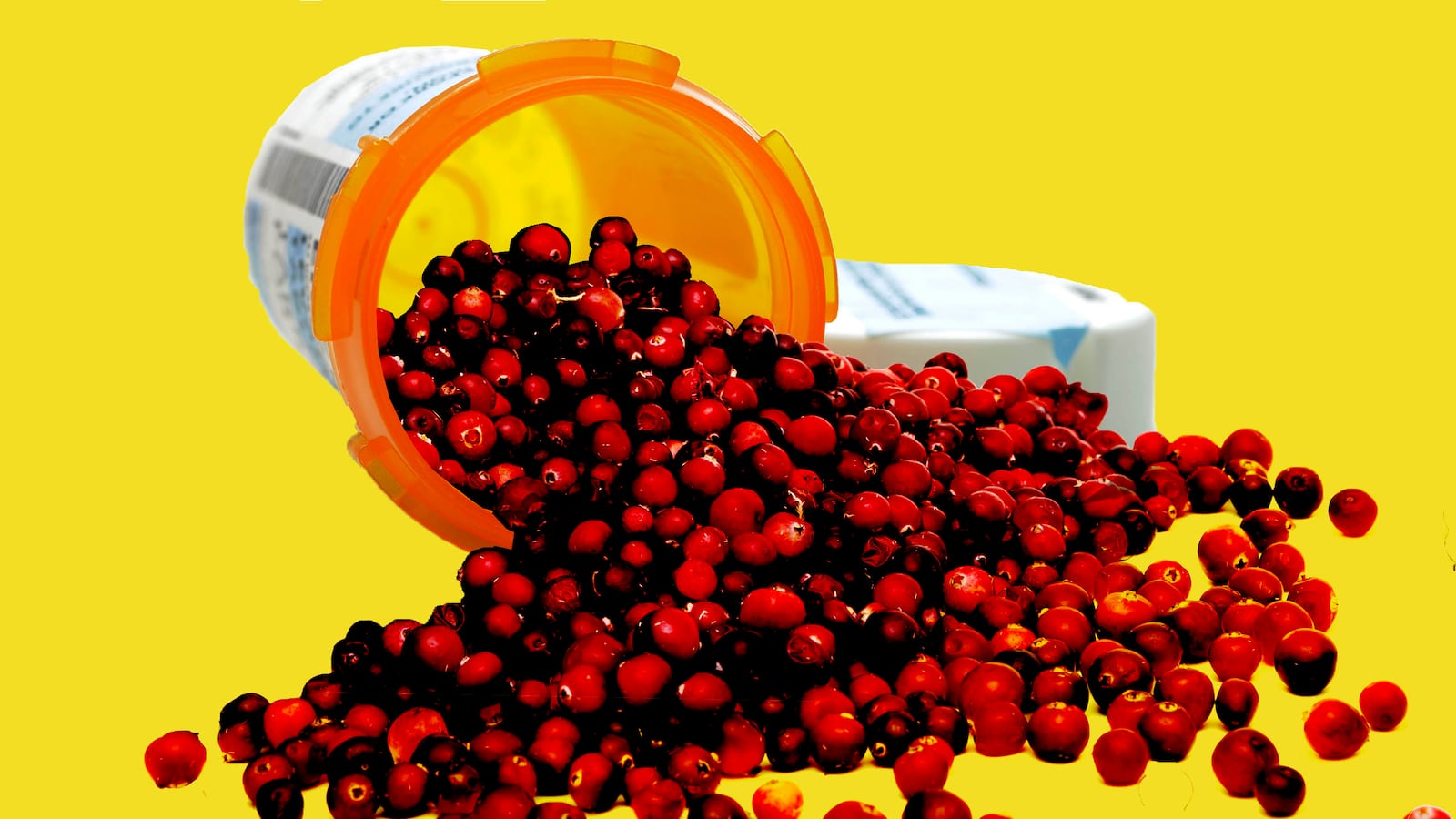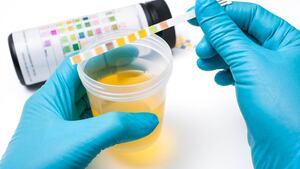Cranberries have held a sacred spot on the Thanksgiving table for centuries, offering a tangy contrast to roast turkey and mashed potatoes.
But every other day of the year, cranberries are revered for another purpose entirely: their purported ability to prevent and cure urinary tract infections, which leave an estimated 50 to 60 percent of women with burning, painful urination at some point in their lifetime.
Proponents claim that cranberries can help prevent UTIs because they have high levels of proanthocyanidins, a chemical which has been linked to a reduction of UTI-causing E. coli bacteria in the urinary tract. Cranberry juice products are thought to cure UTIs because the berry is a diuretic, which helps patients urinate and push more of the bacteria out of their body.
Sounds sensible. But scientific research has cast doubt on these claims—and doctors warn that in some cases, downing cranberry juice in lieu of seeking treatment could lead to serious medical complications.
Cranberry Products Probably Won’t Stop You From Getting a UTI
Despite the hype, the evidence near-overwhelmingly shows that proanthocyanidins (and the cranberry products that contain them) won’t do much to prevent UTIs, Manisha Juthani-Mehta, an infectious disease physician at the Yale School of Medicine, told The Daily Beast.
In 2016, Juthani-Mehta published a study of 185 female nursing home patients in the journal JAMA. For a year, 92 of those women received two oral cranberry capsules—the equivalent of 72 milligrams of proanthocyanidin, or 20 ounces of cranberry juice—while the other 93 received a placebo.
Her team found “no significant differences” in the amount of UTIs between the treatment group and the control group.
Those results are damning for proanthocyanidin, Juthani-Mehta said. Most cranberry capsule products on the market have up to 36 milligrams of proanthocyanidin—but “Even with double this PAC content (72mg in the capsules we tested),” she said, “we were unable to show that capsules worked.”
Betsy Foxman, director of the Center for Molecular and Clinical Epidemiology of Infectious Diseases at the University of Michigan, saw similar results in her own 2011 study, published in Clinical Infectious Disease. Her team studied college women who were given 16 ounces of 27 percent cranberry juice daily for six months and found“absolutely no effect of cranberry juice at all,” Foxman told the Daily Beast.
Their results are also backed by a 2012 meta-analysis conducted by the research organization Cochrane. The group reviewed 24 studies of more than 4,400 patients, and concluded that there was no “significant benefit” to cranberry juice, cranberry tablets, or cranberry capsules.
Foxman found that cranberry juice did work for a different population, however: women with a short-term urinary catheter implant. In that study, published in 2015 in the American Journal of Obstetrics and Gynecology, Foxman’s team observed a 50 percent reduction in UTI rates. And there are some studies—like this 2012 JAMA meta-analysis—that have linked the consumption of cranberry juice with the reduced incidence of UTIs in some populations.
Why the discrepancies? First, it’s hard to compare results from different subpopulations—UTIs in post-gynecological surgery catheter patients are “a different beast” than the garden-variety UTIs of your average college woman, Foxman explained. Juthani-Mehta added that each study tests different compounds—like juice, capsules, powders, and tablets—and different levels of proanthocyanidin, which will inevitably lead to variation in results.
And as Cosmopolitan first pointed out, there could be some conflicts of interest at play—like this study in the American Journal of Clinical Nutrition that found a link between cranberry juice and UTI prevention—but was funded by Ocean Spray.
So what can women count on to prevent UTIs? The most important thing women can do, Juthani-Mehta said, is simple: drink water.
“The mainstay of UTI prevention should be hydration,” she said. “Women at risk for recurrent UTI should try to drink several glasses of water per day. For many women, this intervention alone prevents recurrent episodes.”
They Also Won’t Cure One
While there may not be a definitive answer about the preventative powers of cranberry juice, Foxman said, one thing is clear: It’s not going to treat a UTI on its own.
“The evidence that cranberry juice [could be] an effective treatment for UTIs,” Foxman said, “is pretty strong that it’s not.”
The correct treatment, Foxman explained, is a complicated question. Women who have recurring UTIs are probably fine drinking fluids and taking some Advil, and can always visit a doctor for antibiotics if the pain becomes unbearable. For these women, cranberry juice’s diuretic properties could be a plus.
But women experiencing the UTI symptoms for the first time, she said, should be more cautious—because STDs like chlamydia, which can cause infertility if left untreated, can present with similar symptoms.
And any woman experiencing fever, back pain, or flank pain should go to the emergency room immediately, she added, because those symptoms indicate a possibly life-threatening kidney infection.
All of the above treatments, Foxman said, take precedence over downing cranberry juice. But she took care to note that it won’t cause any harm—and there’s no reason to toss it aside if it appears to be helping.
“If it makes you feel better,” Foxman said, “it’s not going to hurt you.”







